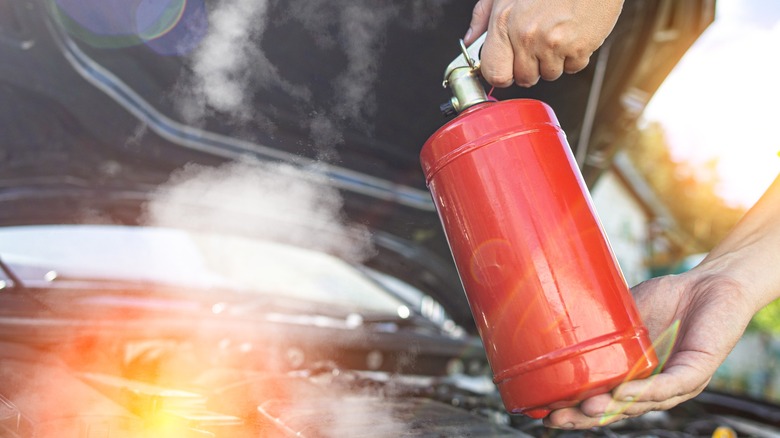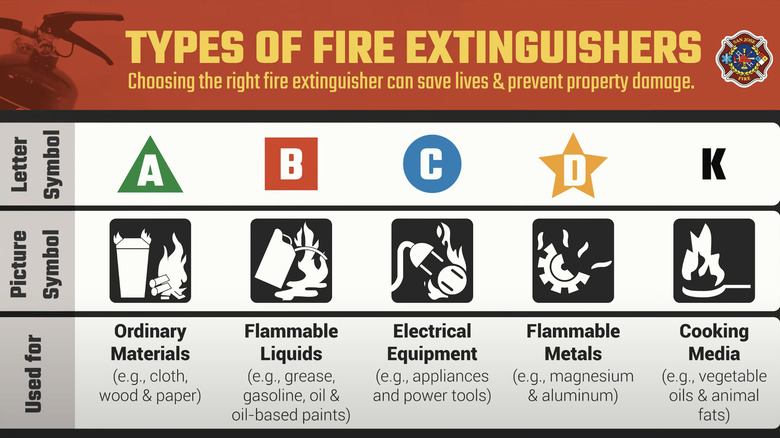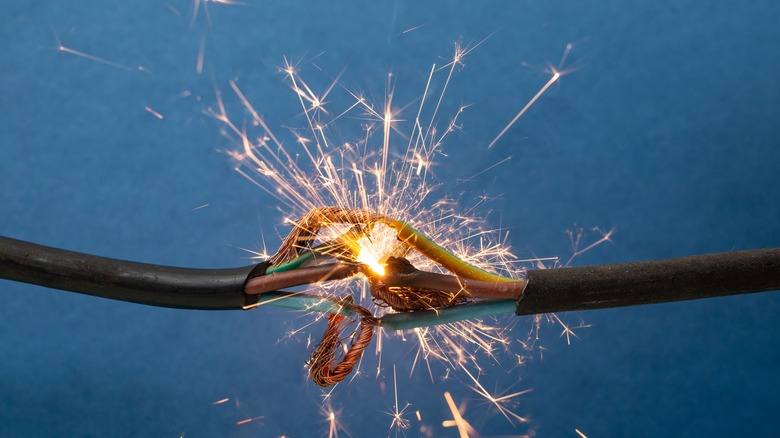What Is A Class C Fire Extinguisher Used For? (And How To Know What Class Yours Is)
Fire can erupt rapidly and unexpectedly. Then, it can spread ravenously. This means it is important to act quickly to put out a fire, but the way that you approach this will be different depending on what kind of fire you are dealing with. An electrical fire, for instance, should be approached differently than a fire that breaks out on wood or a kitchen fire.
Many people's first instinct may be to try dumping water on a fire, but this is the very last thing you'd want to do with an electrical fire. That's because attempting to douse an electrical fire in this manner could shock you, make the fire grow, or both. Fortunately, there is an appropriate way to tackle this unique threat, and it involves a specific class of fire extinguisher.
A Class C extinguisher is designed to tackle electrical fires. Because most types of water conduct electricity well, a fire extinguisher that dispensed only water could exacerbate the issue. Some extinguishers, including Class A ones, are water-based and are designed to handle fires on materials like wood or cloth. In contrast, Class C extinguishers use dry powder, often made of carbon dioxide, to put out electrical fires. This is one type of fire extinguisher you might consider keeping in your car due to the risk of electrical fires.
How to determine which class of fire extinguisher you have
U.S. fire extinguishers are divided into five different types, with the letter system indicating which types of fire they're used for. Multi-purpose extinguishers rated ABC are typically recommended for home use because they are best suited for tackling fires that result from a range of everyday materials, including papers or fabrics (A), liquids like gasoline (B), and electrical fires (C). However, specific buildings might need other types of fire extinguishers as well to suit their specific working environments and needs.
For example, fires involving metals like aluminum require extinguishers rated "D," while fires involving flammable cooking items like oils need extinguishers rated "K." The way to distinguish one type of fire extinguisher from another is to take a look at the body of the device. Doing so, you'll note that they're each carefully marked according to their contents, and so to their use.
Even if you do have exactly the extinguisher you need for the situation, it's absolutely vital to perform standard safety measures before attempting to tackle a fire yourself. That includes identifying an escape route and calling the fire department before anything else. Then, you'll want to determine if the fire is something that you should try to use an extinguisher on. If a fire is clearly growing quickly and in danger of spreading to another room, it is best to retreat and call the fire department. Another sign that the fire is too big to handle on your own is if there is too much smoke in the vicinity to manage it.
How to reduce the dangers of an electrical fire breaking out
Electrical fires are relatively common, with the state of Massachusetts reporting them to be one of the most frequent causes of death among older adults. They can be particularly difficult to handle, so it's important to be aware of any potential signs of an electrical fire so that you can handle it quickly. This may include heat or sparks pouring out of an outlet, or the smell of rubber or plastic burning.
While Class C extinguishers can be very effective in helping to put out an electrical fire, it's best to avoid a fire breaking out and a visit from a bright red fire truck in the first place by following some simple precautions. Electrical fires can break out as a result of poor maintenance of power systems, as well as overloading sockets with too much power. Extensions that allow for several different devices to be plugged in all together should be avoided wherever possible, particularly in cases were more energy-hungry devices are going to be plugged in. This is a common extension chord mistake to avoid that can not only increase the lifespan of your chord but also reduce the risk of fire.
Maintenance and inspections from a registered professional will also help provide an early warning sign of any potential issues that may develop. We're all often guilty of taking power sockets and our many electrical gadgets that require them for granted, but it's vital not to be complacent. Even so, in the case that an electrical fire does break out, a class C extinguisher can be a lifesaver.


